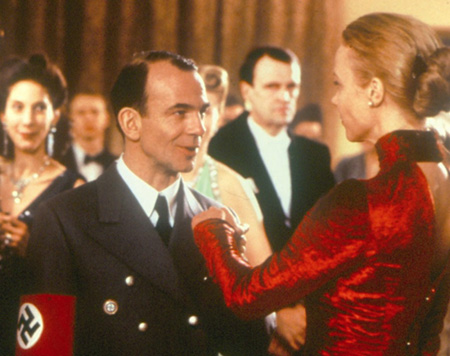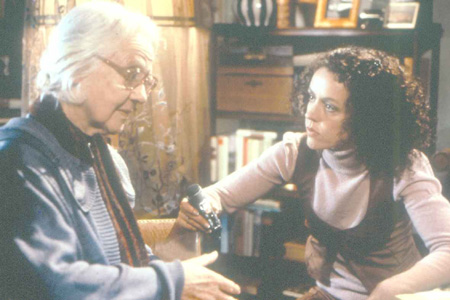In ROSENSTRASSE,
Ordinary Women Accomplish the Extraordinary

Lena
Fisher (Katja Riemann) is introduced to Joseph Goebbels
(Martin Wuttke),
Hitler’s Minister of Propaganda, in a crucial scene from
Margarethe von Trotta’s new film ROSENSTRASSE.
Photos courtesy of Samuel Goldwyn Films
In the United States we are inundated with stories about the Holocaust, from Oscar-winners like THE
PIANIST to routine episodes of LAW & ORDER. Not so Germany, where the subject still triggers painful debates about guilt and complicity. Now
ROSENSTRASSE, the new film by acclaimed director Margarethe von Trotta, tells a story almost no one has heard of, just when we were beginning to think we’d heard them all.
Margarethe von Trotta achieved international fame in the late 60s as the star of films by Rainer Werner Fassbinder and Volker Schlondorff, then established herself as one of Europe’s most respected woman directors. Her protagonists are typically women forced into active protest by historical circumstance. So von Trotta occupies a unique position; she is an activist, a feminist, and a German intellectual, born in Berlin in 1942 and raised in heart of Hell itself. We have never seen the Holocaust from this point of view before.
The character at the center of
ROSENSTRASSE
is a young New Yorker from a prosperous Jewish family named Hannah. Her father has just died, and she reaches out to her mother Ruth for comfort, but Ruth withdraws into herself. A woman tries to speak with Ruth at the shiva, but Ruth rejects her. Hannah hardly knows this cousin, but appeals to her anyway for an explanation of her mother’s behavior. Ruth’s cousin asks Hannah if she knows anything about a German woman named Lena. No, she does not. But Hannah becomes convinced that only knowledge of Ruth’s childhood will bring her mother back to her, and so she flies to Berlin in search of answers.
When Hannah finds her, Lena is ninety years old and still living in Berlin. Hannah does not reveal her identity, she simply tells Lena she’s a journalist researching the Holocaust, and pulls out her tape recorder. Lena, alone in her little apartment, is happy to oblige. In her mind’s eye, Lena returns to 1943. She is young and beautiful, an Aryan woman deeply in love with her Jewish husband, Fabian Fisher. Over several days of increasing intimacy, Lena tells Hannah her whole story.

Posing
as a journalist, Hannah (Maria Schrader)
interviews
Lena
(Doris Schade) in her
Berlin
apartment.
Photo courtesy of Samuel Goldwyn Films.
When Fabian suddenly disappears, Lena tracks him to the Rosenstrasse, a side street in central Berlin that houses a Jewish social service office. Even though the Jewish spouses of German citizens are supposed to be exempt from deportation, a rumor quickly passes from family to family — their missing relatives are being detained in the Rosenstrasse building. And so, day-by-day, the number of people congregating on the Rosenstrasse grows. Lena takes pity on a young girl named Ruth whose mother has also been arrested. Only eight years old with nowhere else to go, Ruth, like her Biblical namesake, cleaves to Lena, goes where she goes, moves in with her.
Most of the historical details in
ROSENSTRASSE
can also be found in the book RESISTANCE OF THE HEART: Intermarriage and the Rosenstrasse Protest in Nazi Germany
by Nathan Stoltzfus, a Harvard-trained historian who currently teaches 20th Century European History at Florida State University in Tallahassee. Stoltzfus and von Trotta did much of their research concurrently and used many of the same sources, including women with histories very similar to Lena’s and Ruth’s. While von Trotta has undoubtedly taken dramatic liberties in filming this story, the driving fact is this: Jewish spouses were interned by the Nazis, and were eventually freed after their German relatives staged a public protest.
*******************
Special Addendum for FF2
by Max Gross (8/19/04)
Meyer Gottlieb, the president of Samuel Goldwyn Films, was in no mood to take criticism of Holocaust movies. As the film executive strode to the stage at New York's Leo Baeck Institute on Monday night for a special screening of the new World War II film,
ROSENSTRASSE, he was filled with anger.
"In my recent [conversations] with the media I heard that there was a 'Holocaust overload,'" Gottlieb, a child survivor, told the sold out audience. "I was shocked. But my shock turned to anger."
"Editors told me, 'The Holocaust is no longer newsworthy,'" Gottlieb said. "Just look at our daily press reports! The media has a responsibility to write and talk about the Holocaust."
"To the media [I say], 'Never forget.' We will not let you forget."
Last week the HOLLYWOOD REPORTER wrote about the difficulties a Holocaust film like
ROSENSTRASSE might have competing with other small independent films like
FAHRENHEIT 9/11 and SUPER SIZE
ME. "On the indie film scene," Gregg Kilday wrote, "foreign-language films are hardly an endangered species. But they have taken a back seat of late to the renewed vogue for documentaries spearheaded by
FAHRENHEIT 9/11."
But few people who attended a screening of
ROSENSTRASSE at the Leo Baeck Institute seemed to care about the economics. A crowd of mostly middle aged Jews--both religious and secular--packed every seat in the house, and a handful waited outside on the off chance that there would be spare tickets.
Margarethe von Trotta's ROSENSTRASSE
concerns a little known episode of German history when the Jewish husbands of Aryan women were rounded up by the Gestapo and detained in a Jewish community center. The wives of these Jewish men waited outside the de facto prison, lobbying the German soldiers and pulling political strings, until their husbands were released.
ROSENSTRASSE, which was in the works for ten years before it reached the screen, fictionalizes the story of Lena (Katja Riemann) an aristocrat who joins the crowd, lobbying her brother's army friends for her husband’s release, and adopting an orphaned Jewish child along the way.
When the movie ended Gottlieb and screenwriter Pamela Katz took the stage for a question and answer session. Most people praised the film, but the audience at the Leo Baeck Institute was hardly typical in building a summer blockbuster. The larger question remains: Is there a glut of Holocaust movies?
"We have to be careful in general" making those estimations, said Dr. Hans-Dieter Stell, the German Deputy Consul General at the UN who attended the screening. "You don't have any--or hardly any--objective criteria [for], 'What is enough?'"
When ROSENSTRASSE
was released in Germany last year, it was widely discussed. "Whenever this [a new movie about the Holocaust] comes out, it is openly and widely discussed in DER SPIEGEL, magazines, TV and so on," Dr. Stell said in a follow-up interview on Wednesday.
For Germans ROSENSTRASSE
was distinct from most Holocaust movies. "In Germany it... [raised] the question, to what extent resistance was possible [and the] larger effect on saving more Jews," said Dr.
Stell.
Moreover, the character of Lena is the hero of the film; something that is often appealing for Germans. In most films "Jewry is seen as the victims, the soldiers and army as rude and brutal oppressors," said Dr. Stell. Seeing a German hero "breaks up the cliches of black and white... This showed a bit more of the human face."
Annette Insdorf, author of INDELIBLE SHADOWS: FILM AND THE HOLOCAUST (now in its third edition) and director of undergraduate film studies at Columbia University, also spoke on Monday night. In her remarks before the screening, she noted that
ROSENSTRASSE hits on three extremely important themes of Holocaust literature: resistance to the Nazis, hidden children, and the attempt of a child of survivors to piece together a parent’s holocaust past – particularly when the parent has been secretive about it.
In their remarks on Monday night, Insdorf and screenwriter Katz both noted that the film is also extremely feminist and modern. “The film’s events are set in motion by women,” Insdorf said. “The addition of the [present day narrative] adds a degree of truth. Instead of the Holocaust tale unfolding ‘objectively’ we see it through the memory of a particular woman who lived through it.”
"I don't believe there can be too many Holocaust films--as long as they are good!" said Professor Insdorf in a follow-up e-mail message. "While it is true that the Holocaust has moved from being a commercially 'taboo' subject to a viable one – especially after
SCHINDLER’S LIST – the subject includes more dramatic stories than the cinema could ever encompass. For example, I do not believe there has been a glut of films about rescue or resistance, which makes
ROSENSTRASSE a desirable addition to the genre of Holocaust cinema."
“Fortunately,” Insdorf added, “most Holocaust-related films are not big-budget, which means that they do not have to reach a mass audience. If a film like
ROSENSTRASSE appeals to an art-house crowd in major cities, it can do reasonably well. I am delighted that the audience for documentaries has been growing, but do not believe that prevents a film like
ROSENSTRASSE from attracting viewers. There are moments when we want good fiction films too!”
Katz was hired as a writer on the project after the historical part of film was already written. She expanded the story by starting it off with a young New York woman searching for her mother's story in modern Germany, touching on what Insdorf said was one of the great themes of Holocaust cinema: a child searching for a parent’s past.
Might this make the film more palatable to a modern, American audience?
For the most part, audience members at the Leo Baeck Institute seemed to approve of the film. However, someone asked Katz if the film didn't "Maximize the heroism [of the time] which is infinitesimal?"
Katz acknowledged that ROSENSTRASSE
dealt with a very small pocket of resistance.” Then she quoted a line from the movie. "This was a triumph," Katz said, "but it was only a tiny ray of light in the darkness."
Brooklyn-based writer Max Gross is a frequent contributor
to the FORWARD & the NEW YORK POST.
He can be reached at Max.Gross@alum.Dartmouth.org.
FF2
NOTE:
Jan's article is a slightly expanded version
of the review originally published
in the September 2004 edition of the
WORLD
JEWISH DIGEST
(Volume 1 Number 12)
& is posted here with their permission.
For WJD subscription information:
Call 312.332.4172 extension 42
or
Fax 312.332.2119
IMPORTANT FINAL NOTE FROM JAN:
In my original review in the WORLD JEWISH DIGEST, I wrote: “ROSENSTRASSE is based on the book RESISTANCE OF THE HEART: INTERMARRIAGE AND THE ROSENSTRASSE PROTEST IN NAZI GERMANY by Nathan
Stoltzfus…”
I was wrong about this. Von Trotta interviewed many of the Rosenstrasse survivors on her own, and she wrote the first drafts of the screenplay long before reading Stoltzfus’ book. Their research was therefore simultaneous.
Now that both works (the book and the film) are commercially available, Stoltzfus and von Trotta are publicly supportive of each other and sometimes appear in joint presentations. For example, when NPR’s Pat Dowell broadcast her feature on the LA premiere of
ROSENSTRASSE, she interviewed both Stoltzfus and von
Trotta.
I am grateful to screenwriter Pamela Katz for setting me straight on this point. According to Pam: “We are all fans of Nathan’s book!”
